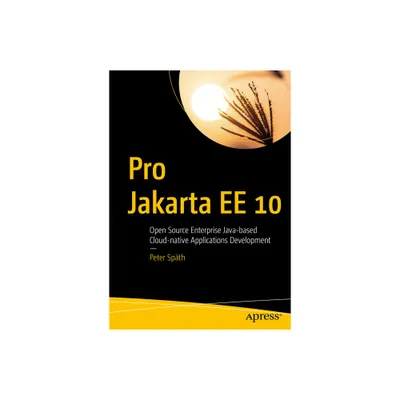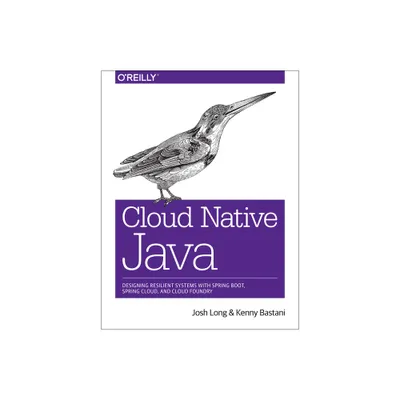Home
Pro Jakarta EE 10: Open Source Enterprise Java-based Cloud-native Applications Development
Loading Inventory...
Barnes and Noble
Pro Jakarta EE 10: Open Source Enterprise Java-based Cloud-native Applications Development
Current price: $64.99


Barnes and Noble
Pro Jakarta EE 10: Open Source Enterprise Java-based Cloud-native Applications Development
Current price: $64.99
Loading Inventory...
Size: Paperback
*Product Information may vary - to confirm product availability, pricing, and additional information please contact Barnes and Noble
Welcome to your in-depth professional guide to the open source Eclipse Jakarta EE 10 platform. This book will help you build more complex native enterprise Java-based cloud and other applications that can run in corporate and other mission-critical settings. The majority of the key Jakarta EE 10 APIs or features are dissected in this book, including JSF, JSP, JPA, CDI, REST, Microprofiles, WebSockets, and many more. Along the way, various open source Apache, Eclipse, and other projects are integrated and used for more complete workflows and treatment in general.
Jakarta EE 10 comes with a significant number of improvements over Java EE 9 technologies and adopts a series of new technologies. This book starts out with a concise development procedure proposal and shows NetBeans as an alternative IDE to Eclipse. It also talks about versioning, software repositories, and continuous integration techniques. The web tier of enterprise application architectures is covered, including state-of-the-art techniques such as web sockets and front end (JavaScript) related frameworks.
The book presents a survey of architecture-related advanced topics, including micro profiles. In a supporting technologies chapter, JSON and XML processing methods are revisited and deepened, and the usage of scripting engines is introduced.
A resources chapter discusses enterprise resource integration, such as resource adapters and Hibernate as a mapper between the SQL and the Java world. Also covered is the usage of no-SQL databases. A security chapter shows advanced security enhancement techniques for use of Jakarta EE in corporate environments. The last chapter talks about advanced logging and monitoring techniques, serving both developers and operations staff.
What You Will Learn
• Build complex Jakarta EE applications that run in corporate or other enterprise settings
• Create a professional development workflow using Jakarta EE
• Build more advanced web development applications
• Work with more advanced supporting technologies to increase application maturity and stability in a corporate environment
• Do enterprise resource integration, including custom resource adapters
• Utilize security enhancements of enterprise-level Jakarta EE applications
• Leverage techniques to monitor and log in a corporate environment, including memory usage and performance troubleshooting
Who This Book is For
Experienced Java programmers and web developers, especially those with some prior experience with the Java EE platform
Jakarta EE 10 comes with a significant number of improvements over Java EE 9 technologies and adopts a series of new technologies. This book starts out with a concise development procedure proposal and shows NetBeans as an alternative IDE to Eclipse. It also talks about versioning, software repositories, and continuous integration techniques. The web tier of enterprise application architectures is covered, including state-of-the-art techniques such as web sockets and front end (JavaScript) related frameworks.
The book presents a survey of architecture-related advanced topics, including micro profiles. In a supporting technologies chapter, JSON and XML processing methods are revisited and deepened, and the usage of scripting engines is introduced.
A resources chapter discusses enterprise resource integration, such as resource adapters and Hibernate as a mapper between the SQL and the Java world. Also covered is the usage of no-SQL databases. A security chapter shows advanced security enhancement techniques for use of Jakarta EE in corporate environments. The last chapter talks about advanced logging and monitoring techniques, serving both developers and operations staff.
What You Will Learn
• Build complex Jakarta EE applications that run in corporate or other enterprise settings
• Create a professional development workflow using Jakarta EE
• Build more advanced web development applications
• Work with more advanced supporting technologies to increase application maturity and stability in a corporate environment
• Do enterprise resource integration, including custom resource adapters
• Utilize security enhancements of enterprise-level Jakarta EE applications
• Leverage techniques to monitor and log in a corporate environment, including memory usage and performance troubleshooting
Who This Book is For
Experienced Java programmers and web developers, especially those with some prior experience with the Java EE platform


















